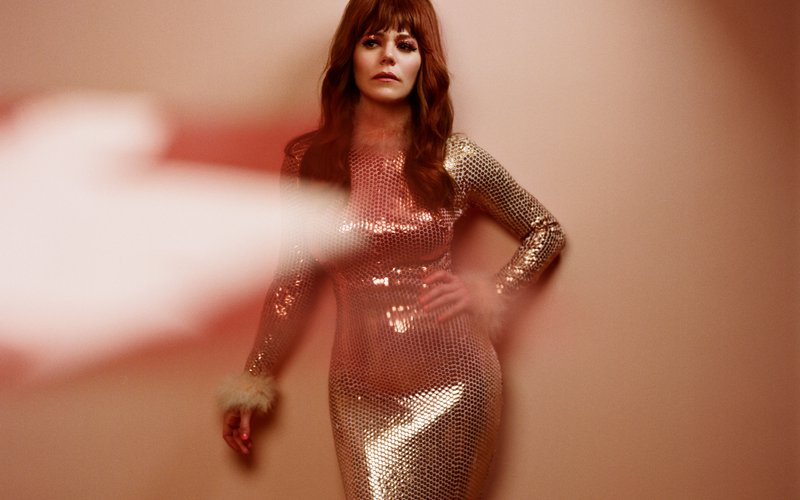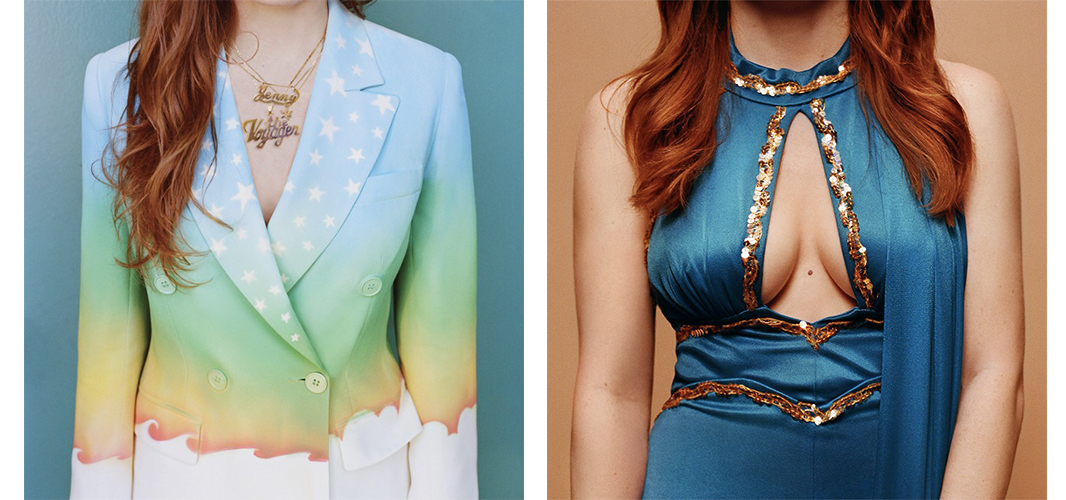
On this last week's episode of Sound & Vision, KEXP's Dusty Henry profiles Jenny Lewis – who you might recognize from such bands as Rilo Kiley and The Postal Service – and her new album 'On The Line.' Listen to the audio feature and read a written version below.
On the cover for her new album On The Line, Jenny Lewis wears a silky cerulean dress, bedazzled with glittering gold sequins. Lewis says the dress is nearly identical to one her mother wore on stage while performing in a band with Lewis’ father in Las Vegas during the 1970s.
“I think I'm always returning to that time because that's when my parents were together,” Lewis says over the phone.
Lewis’ mother passed away while she was still writing the songs that would eventually become On The Line. Two weeks after our call, she’d later reveal in a Rolling Stone profile that her mother died from liver cancer, a result from untreated hepatitis C, and was a lifelong heroin addict. It’s something Lewis had alluded in her music with the acclaimed indie rock group Rilo Kiley in the 2000s, but nothing something she’s ever spoken about so directly.
It was a trying time for Lewis, who was also mourning to end of a relationship with longtime boyfriend and former Jenny & Johnny bandmate Jonathan Rice. She’d spend weeks with her mother in the hospital room. They’d sing together, her mother helping her write harmonies, and they’d listen to Bob Dylan’s Time Out of Mind. Lewis documents these last days together in the song “Little White Dove.”
“Was it a dream? Under the holy cross in the valley below,” she sings on the track. “A mother and child, emergency behind a yellow curtain on the second floor / All the guardian angels at the door with their long white coats and their stethoscopes.”
Reckoning with her personal history and troubled relationships is a familiar topic for Lewis. On The Line follows Lewis’ 2014 album The Voyager – another record in which she found herself reckoning with past traumas, the break up of Rilo Kiley, and trying to find a new way forward.
“I feel like I say that with every record. I'm like, ‘This was the worst period of my life.’” she says. “And I'm like, ‘Wait, I've said that for the last three records.’ Let's hope on the next one that I have a different story to tell."
In this harrowing time, Lewis’ headspace and songs began to turn back to that comforting time of her childhood. Born in 1976, she herself is a child of the 70s. The era left an impression on her, from the way she dresses to the films and albums she adores. Never has that side of her been felt more than with On The Line.
Her love of the era’s pastiche goes beyond just the cover. Opening track “Heads Gonna Roll” feels like a vintage Laurel Canyon ballad about heartbreak and vices, that is until she throws in a line about disagreeing with a lover about “Elliott Smith and grenadine.”
Lewis recorded the album at Capitol Records’ historic Studio B, playing on the same piano used by Carole King on her 1971 classic Tapestry. Her backing band includes a who’s who of the era – Ringo Starr, Don Was, Tom Petty and the Heartbreakers keyboardist Benmont Tench, and session drummer Jim Keltner – just to name a few. She’d later realize that all her bandmates and once played with Bob Dylan. Everything was recorded live in the room, Lewis opting to play piano and sing simultaneously rather than tracking them separately.
“I'm playing and singing live – with these legendary musicians. So you can feel that on the tracks.” she says. “And I think that's what you felt from those records in the 70s... There's this sense of air too, like the tape gives this fog, this layer of air. And you're feeling a real vibe between humans in the room and it's imperfect and you can hear the mistakes. But that's part of what makes it human.”
Much like the great singer-songwriter records of that bygone era, On The Line is a deeply introspective-yet-glitzy work of artistic confession. Lewis says the songs mirror her real life, experiences she says that aren’t all that different from what everyone goes through – “love and loss and breakups and rebounds and death and rebirth.”
“Whenever things get complicated you run away to Mexico. Boy, you got me infuriated
I'm never gonna let you go,” she sings on the album’s title track.
Lewis is fastidious when it comes to documenting her thoughts and ideas, constantly jotting down notes or little lines of inspiration as they come to her. She even confides that the stirring On The Line piano ballad “Taffy” originated as a poem that she scribbled on an airplane barf bag. Even as she’s writing, she says her own ideas allude her. She calls it a type of magic, with songs sometimes revealing their meaning to her only after the fact.
At the same time, she says she’s also refined her process, becoming more particular with her lyrics and phrasing as opposed to the stream of conscious she took with early Rilo Kiley records.
“There's a level of perfectionism because no one else is going to care as much as you about your song than you. I labor over every lyric, every ‘and,’ ‘but,’ ‘or,’ ‘he,’ ‘she.’ This is the stuff that keeps me up at night,” she says.
The album’s cover reveals even more of what Lewis calls the “weird magic” involved in the songwriting process. Renowned music photographer, and Lewis’ close friend, Autumn de Wilde has shot all the covers for Lewis’ solo works, as well as Rilo Kiley’s final album Under the Blacklight.

Lewis describes herself as particular over every facet of the visual components for her albums, down to the typeface. With de Wilde, she says she’s found someone who really understands her aesthetics. The two met at Lewis’ house for a photoshoot. It didn’t take long for the magic to appear after de Wilde took a Polaroid of Lewis in her blue dress, focusing on just her torso and framed almost identically as the cover to The Voyager.
“The moment I saw the Polaroid hit the ground – because she said it down to dry – I knew that was the cover,” she says. “And then I understood that this was a companion piece to 'The Voyager.' And it's the same shot! I'm just wearing something different, which has a completely different feel. But it's the same person.”
Lewis says the thematic connections between both records is a testament to being open to life’s lessons. She says there’s always room for “growth and self-reflection and becoming a better person, a better listener.” It’s something she says she’s just beginning to grasp as she’s gotten older.
“You think you know everything in your 20s, you don't know shit. It's like, you don't know anything. In my 30s I thought I knew, I didn't know anything. Now? I don't know! But I know a little bit more,” she says.
After decades of channeling heartbreak into indie rock anthems, On The Line finds Lewis discovering new ways to tackle old demons. The album allows her to be the 70s icon she could’ve been in a past life, sounding sharper and more open to her audience than ever before.
“I think that danger for an artist is feeling that you've arrived or you've done your best work or something, because then where are you going to go from there?” she says. “I'm like the slowest moving train. I'm such a late bloomer. I feel like I'm just kind of beginning now.”
It's the third single from her forthcoming record On the Line
The On the Line opening track features Ringo Starr on drums, Don Was on bass, and The Heartbreaker’s Benmont Tench on keys
Jenny Lewis' fourth solo album will arrive March 22